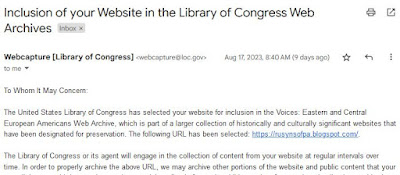Last week I was surprised with this fascinating email from the Library of Congress:
To Whom It May Concern:
The United States Library of Congress has selected your website for inclusion in the Voices: Eastern and Central European Americans Web Archive, which is part of a larger collection of historically and culturally significant websites that have been designated for preservation. The following URL has been selected: https://rusynsofpa.blogspot.com/.
The Library of Congress or its agent will engage in the collection of content from your website at regular intervals over time. In order to properly archive the above URL, we may archive other portions of the website and public content that your page links to on third party sites such as social media platforms. In addition to the aforementioned collection, archived content from your website may be added to other relevant collections in the future. This content will be available to researchers at Library facilities and by special arrangement. It may also become more broadly available through hosting on the Library’s public website, which would be done no sooner than one year after it was collected. For more information on the web archiving process, please read our frequently asked questions.
The Library hopes that you share its vision of preserving digital content and making it available to current and future generations of researchers. As the internet has become an increasingly important and influential part of our lives, we believe the historical record would be incomplete if websites like yours are not preserved and made a part of it. We encourage you to learn more about the Library’s Web Archiving program and explore our collections to see examples of how we archive websites. [...]
Thank you.
Library of Congress Web Archiving Team
webcapture@loc.gov
Well, for starters, I'm honored! I didn't even know such an entity as "Voices: Eastern and Central European Americans Web Archive" existed, which I'll have to dig into and see what else is there.
Also, here's a related LOC blog post from August 23, 2023:
Finding and Sharing Eastern European Voices
Original material is © by the author, Richard D. Custer; all rights reserved.

